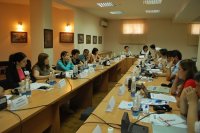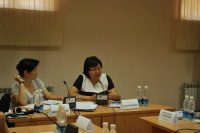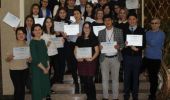20-06-2014, 10:20 Category: English, Media Diversity, News
 The participants agreed the idea of diversity and multilinguism
should be supported and widely promoted to make representatives of all ethnic
groups living in Kyrgyzstan feel themselves comfortable and equal. However, media
attempts are not sufficient. A package of measures is required at the level of
state policy.
The participants agreed the idea of diversity and multilinguism
should be supported and widely promoted to make representatives of all ethnic
groups living in Kyrgyzstan feel themselves comfortable and equal. However, media
attempts are not sufficient. A package of measures is required at the level of
state policy.
The Civil Identity: Unity in Diversity. The Role of Media, Government and Society conference was held in Bishkek on June 17.
The event was organized by the School of Peacemaking and Media Technology of the "Network of Social Mediators” Public Foundation funded by the Freedom of Information Program of Soros Foundation – Kyrgyzstan as part of the Encouraging Diversity through Media project.
The conference involved representatives of authorities responsible for implementation of state programs on interethnic relations and language policy, heads of leading media and ethnic communities, scientists and experts.
The speakers presented 15+ presentations on the state policy of the media scene building in terms of language, access to information in languages of various ethnic groups, told about current situation of ethnic media, discussed the issues of education in ethnic journalism. (Presentations are available here:http://www.ca-mediators.net/ru/119-prezentacii-uchastnikov-konferencii.html)
 Mira Karybaeva, head of the
department of ethnic, religious policy and interaction with the civil society
of the Kyrgyz Republic Presidential Administration, noted that diversity in
Kyrgyzstan will be improved since almost 28% of populations are representatives
of ethnic groups; therefore, it is essential that this topic is covered by the
media.
Mira Karybaeva, head of the
department of ethnic, religious policy and interaction with the civil society
of the Kyrgyz Republic Presidential Administration, noted that diversity in
Kyrgyzstan will be improved since almost 28% of populations are representatives
of ethnic groups; therefore, it is essential that this topic is covered by the
media.
Ainura Temirbekova, deputy minister of Culture, Information and Tourism, said the system of state commissioned content can motivate the production of [TV] reports about language and ethnic diversity. "The government is ready to fund the production of programs covering the lives of ethnic groups and video clips about the strengthening of unity and accord.” The government is already developing the state commissioned content regulations.
"The Freedom of Information Program of Soros Foundation – Kyrgyzstan is working to have the media encourage stable peacekeeping, and also nurture civic identity,” Elina Karakulova, Program Manager, said. "Kyrgyzstan has such a diverse population, rich history of co-existing diverse groups that it is crucial to maintain diversity not only at the level of media discourse, but also at the level of policies to have ordinary people feel this vector in everyday lives.”
During the discussion, it was suggested to set a percentage quota for diversity-related content production and program broadcasting in terms of public contract, and for the languages of various ethnic groups in the total broadcasting time of local TV and radio companies. This support would facilitate development of tolerance, language diversity in the media scene, which is too restricted today.
Forum participants identified a paradox supported by researches and surveys of the audience: the need of ethnic groups for information presented in their mother tongue is strong, yet the media do not tend to meet this need.
Zulfia Sukhuza, editor-in-chief of Hueyimin bo newspaper published at the expense of Dungan ethnic community, told about the need of the community for information in their mother tongue. The newspaper that has a small circulation and is published twice a month does not supply this need. "Once a program in Dungan language was broadcasted on the state TV channel, but it was closed 10 years ago,” she complained. "We would like to resume the program, but haven’t still found support from OTRK.”
According to Svetlana Gafarova, head of Osh-based media monitoring group of the School of Peacemaking and Media Technology, the situation with Uzbek media has not improved significantly in the last four years. Uzbek media have nearly disappeared from the media sphere after ethnic violence in southern Kyrgyzstan in June 2010. The attempts of initiators to establish independent TV channels and internet outlets are partly successful despite the fact that a large group of users of information in Uzbek language reside in the south of the country.
Moreover, reporters avoid touching upon the issues of diversity importance, tolerant community, language rights and cultural self-fulfillment, and prefer skipping this ethnic topic.
Nazira Jusupova, of the Radio Most community radio station, told about the activities of community media that fill the information vacuum in the villages of Talas region. Their experience can be integrated into compact ethnic communities.
A package of proposals created by results of the forum will be analyzed and become the basis for recommendations during the next forum to be held in fall 2014.

The School of Peacemaking and Media Technology in Central Asia announces an annual competition among students from Kyrgyzstan, Kazakhstan,…

25 journalists and media workers from various regions of Kyrgyzstan have been trained to counter the propaganda of violent extremism and hate in…